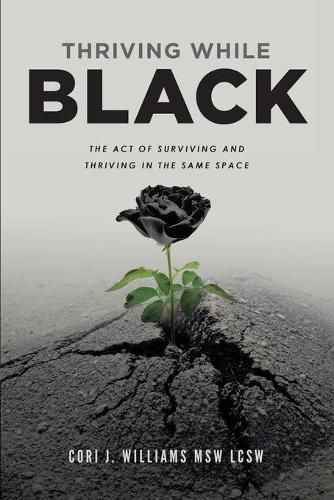Readings Newsletter
Become a Readings Member to make your shopping experience even easier.
Sign in or sign up for free!
You’re not far away from qualifying for FREE standard shipping within Australia
You’ve qualified for FREE standard shipping within Australia
The cart is loading…






This title is printed to order. This book may have been self-published. If so, we cannot guarantee the quality of the content. In the main most books will have gone through the editing process however some may not. We therefore suggest that you be aware of this before ordering this book. If in doubt check either the author or publisher’s details as we are unable to accept any returns unless they are faulty. Please contact us if you have any questions.
Thriving While Black sets out to explore the psychological and emotional consequences of being Black in corporate America. Ain’t I an American? the famous words of Langston Hughes, is a question every Black person unwittingly asks themselves. The playing field for Whites and Blacks is not equal, whether in education, science and technology, life expectancy, earning, or social strata. Blacks have been discriminated against and excluded based on their skin color, which creates the question of what their place is in America.There exist persistent Black inequalities in the structural make up of America; inequalities not inherent due to the differences in the abilities of Whites and Blacks but instead, due to the differences in access to opportunities between the two groups.Black workers in corporate America have to grapple with racial microaggressions in the workplace, which often involves White workers assuming that their Black counterparts are intellectually inferior to them. Thus, Blacks are passed over when important decisions are being made because of the belief that they have nothing intellectual to bring to the table; a phenomenon that is an obstacle to the upward mobility of Blacks in different organizations. Thriving While Black portrays that Blacks are Americans too and should not have to be seen as less and unequal! Their humanity should not be reduced to mere negative stereotypes. If America truly prides itself in diversity, there shouldn’t be a forced need for Blacks to adopt mainstream White culture, hair styling, speech mannerisms, dress codes, etc., and neglect their own African-American identity just to fit into corporate America. The beauty of diversity is not gathering different and diverse people and trying to make them act the same way. Instead, it is bringing diverse people together and allowing their diversity to thrive. This is the focus of this book.
$9.00 standard shipping within Australia
FREE standard shipping within Australia for orders over $100.00
Express & International shipping calculated at checkout
This title is printed to order. This book may have been self-published. If so, we cannot guarantee the quality of the content. In the main most books will have gone through the editing process however some may not. We therefore suggest that you be aware of this before ordering this book. If in doubt check either the author or publisher’s details as we are unable to accept any returns unless they are faulty. Please contact us if you have any questions.
Thriving While Black sets out to explore the psychological and emotional consequences of being Black in corporate America. Ain’t I an American? the famous words of Langston Hughes, is a question every Black person unwittingly asks themselves. The playing field for Whites and Blacks is not equal, whether in education, science and technology, life expectancy, earning, or social strata. Blacks have been discriminated against and excluded based on their skin color, which creates the question of what their place is in America.There exist persistent Black inequalities in the structural make up of America; inequalities not inherent due to the differences in the abilities of Whites and Blacks but instead, due to the differences in access to opportunities between the two groups.Black workers in corporate America have to grapple with racial microaggressions in the workplace, which often involves White workers assuming that their Black counterparts are intellectually inferior to them. Thus, Blacks are passed over when important decisions are being made because of the belief that they have nothing intellectual to bring to the table; a phenomenon that is an obstacle to the upward mobility of Blacks in different organizations. Thriving While Black portrays that Blacks are Americans too and should not have to be seen as less and unequal! Their humanity should not be reduced to mere negative stereotypes. If America truly prides itself in diversity, there shouldn’t be a forced need for Blacks to adopt mainstream White culture, hair styling, speech mannerisms, dress codes, etc., and neglect their own African-American identity just to fit into corporate America. The beauty of diversity is not gathering different and diverse people and trying to make them act the same way. Instead, it is bringing diverse people together and allowing their diversity to thrive. This is the focus of this book.